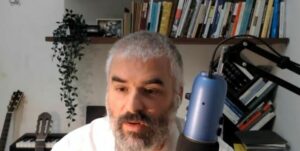Between judicial reform and large-scale protests, it can be difficult to keep up with recent Israeli news. But the Knesset recess, which started in early August and is set to last until mid-October, provides those invested in current events in the country with a brief opportunity to assess where it stands and where it can go from here.

The Baltimore Jewish Council recently held “Catching our Breath During the Knesset Recess: An Update on Israel,” a virtual discussion with “Times of Israel” Senior Analyst Haviv Rettig Gur about the current state of Israeli politics and what might happen when the Knesset resumes work.
Gur is an Israeli native whose work for the Times often focuses on assessing political developments in the country. During an hour-long discussion, he spoke about the recent passage of the first stage of Prime Minister Benjamin Netanyahu’s proposed judicial reform plans and how Israel’s political climate has changed in response.
“It’s a complicated time in Israel, in a sense that we’re in between very dramatic developments,” Gur said.
The passed portion of the reforms heavily affects the Israeli Supreme Court’s reasonableness standard, which a June 2023 Haaretz article written by Allison Kaplan Somer describes as a clause designed to prevent the passage of “unreasonable” decisions — “unreasonable,” in this case, referring to laws passed to advance political interests without considering how they affect the general public. With the first part of the reforms now written into law, the Supreme Court’s ability to declare decisions unreasonable was significantly stripped back.
The reform is widely unpopular, sparking protests across the country on top of those that have been going on since the reform package was revealed by Justice Minister Yariv Levin in January.
“This moment has seen the birth of a new, diverse left that includes many right-wingers and people who call themselves centrists … that did not exist eight months ago,” Gur explained. “We’re in a moment of deep crisis and incredible fear, and there’s the feeling of something major falling apart.”
This has created a great deal of turmoil in the country. Gur went on to describe the state of things in Israel — volunteer reservists for the Israel Defense Forces are now refusing to serve, for example. He noted that while the Israeli right has often viewed liberals as “elites,” this recent decision has shown that they are the backbone of Israel’s army.
Instead, many have turned against political campaign managers, a change in opinion that Gur believes is justified.
“Campaign strategists are the bane of the democratic world,” he said. “They are paid to figure out ways for people to hate each other because hate and fear get out the vote more than unity, understanding and thoughtfulness.”
He also added that he is not opposed to restricting the power of the Supreme Court somewhat, as it has significantly more influence than the Supreme Courts of other countries. However, the current judicial reforms have gone too far, he said.
The program was put together by The Associated: Jewish Federation of Baltimore’s Insight Israel Forum, which organizes educational programs for Jewish Baltimoreans interested in learning more about the country and its current events. The forum has offered opportunities for education and dialogue with Israeli citizens for the past five years.
“The forum really allows the Baltimore community leadership to deepen and enhance their connection to Israel while strengthening our abilities to have respectful discourse around Israel,” said Sarah Jacobs, manager of the Insight Israel Forum.
Gur ended the discussion by stating that he is ultimately hopeful for Israel’s future, despite how tumultuous things have been in recent months. He noted that when the Knesset resumes, it will likely be “louder and angrier” than usual.
“We are seeing the birth of a new intellectual, ideological framework. Call it democracy, call it liberalism, call it secularism … we’re trying to figure out what it is,” he said. “I’m optimistic because I believe in Israelis. Ordinary, stupid Israelis like me.”







